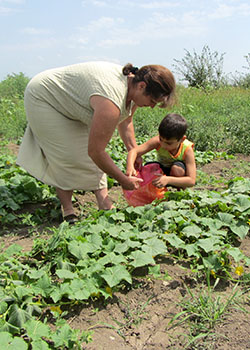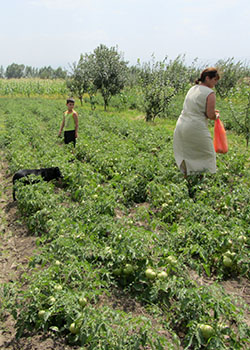Story and Photos by Nino Tskhadadze | Communication Officer | Rural Development for Future Georgia
Edited by Medea Tsitskishvili | Program Director | Heifer Georgia

“Our village is near the border and we still can hear the sounds of shooting from Tskhinvali,” said Eka Surameli. The 42-year-old mother of four children, three daughters and a son, and two grandchildren, continued her story as we walked to her garden at the village’s edge.
She told me the Russian-Georgian war ended in 2008, but people living in border villages are still affected by the conflict. “My four children saw the cruelty of war; they will never forget those days,” Eka said.
It was mid-day in Georgia’s Khurvaleti village and although the day was very hot, Eka’s youngest son Guri, 7, was accompanying us. Guri remembers spending two months as one of the Internally Displaced Persons (IDPs) in a Tbilisi kindergarten after the war.
“I wanted to go back to my village and cried a lot, and the day when father told me that we were going back home I was the happiest boy. I will remember this throughout my life and will never forget,” he said, then let out a breath.
Eka remembered her garden before the war, “Me and my husband used to grow different kinds of fruits and vegetables; it was our food for the whole year. But when the war started and soldiers came in our village we had to leave our houses and gardens full of harvest. After the war, my family, like some other villagers, returned to our places. The village was empty, my house destroyed, no fruit trees, and no garden. All that remained was the house’s walls and black grass around it.”
In 2011, Rural Development for Future Georgia (RDFG) partnered with Heifer Georgia to improve the livelihoods and economic conditions of IDPs and local residents in the Shida Kartli region.
Three modern greenhouses were constructed in the villages of Brotsleti, Khurvaleti and Lamiskana. The projects have high productivity, early harvest tomato seedlings and training for 1,440 beneficiaries. The greenhouses also serve as modern greenhouse technology demonstration plots for the project’s farmer schools. The schools provide building opportunities in agricultural technologies through training, agronomic services, demonstrations and practical exercises.
“Thanks to Heifer International, to generous people who gave us a stimulus to start our life from the beginning,” Eka said. “The seedlings we received from the project were planted near my house; these seedlings are special and we get from them very tasty and high quality tomatoes. It would be great if we could receive other vegetable seedlings, too.”

Eka attended training on modern agriculture technologies. The project provided her with new production methods and increased her harvest. With the help of the village’s greenhouse, she also learned how to water plants through utilizing a drip irrigation system.
“Believe me, this was an innovation for me and for all villagers,” she said. “Now we are more confident in our future. Heifer Georgia together with the RDFG staff helps us market our tomatoes, and I even have my own income that I can spend for my family’s needs.”
When we arrived at Eka’s garden, I saw tomatoes, cucumbers and an orchard full of various fruit. I understood her enormous amount of work. She explained that after the war people had to work twice as hard to feed their families. Life in Khurvaleti village is not as joyful as it once was, but people living in border villages are trying to stand on their feet and make their children’s lives happy. Heifer creates a better life for people and gives them the most important thing-hope for a peaceful future.